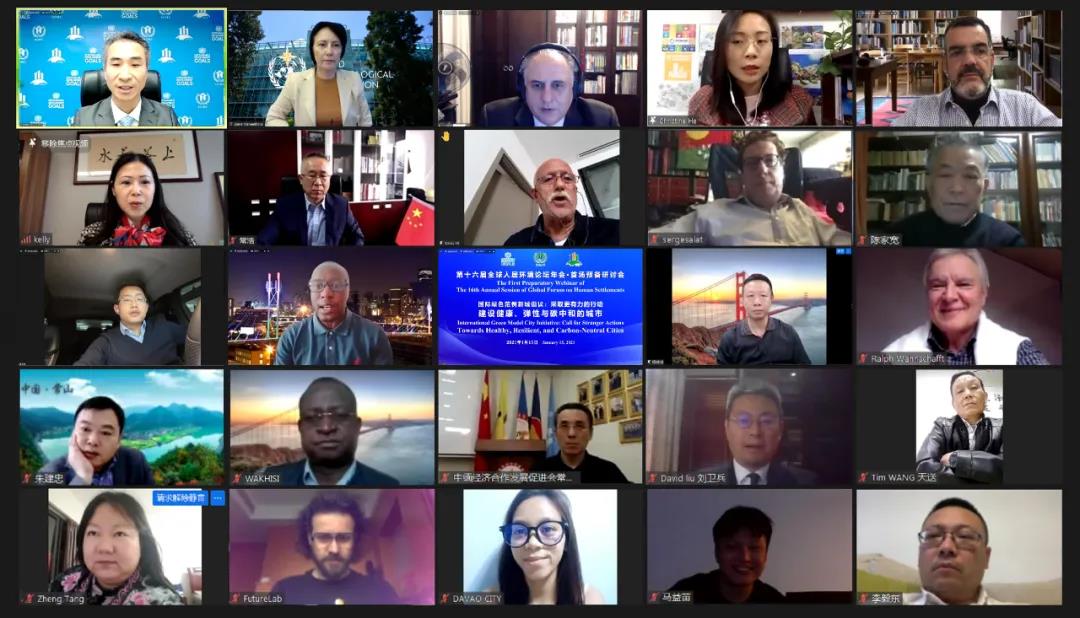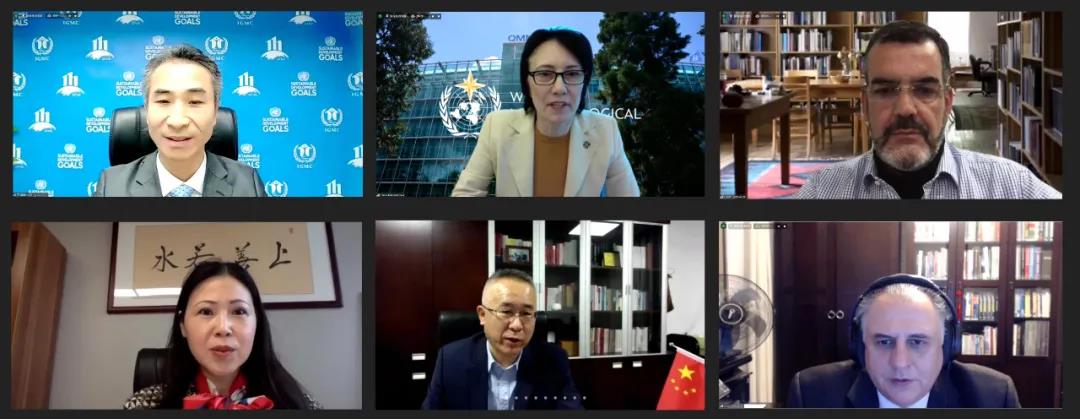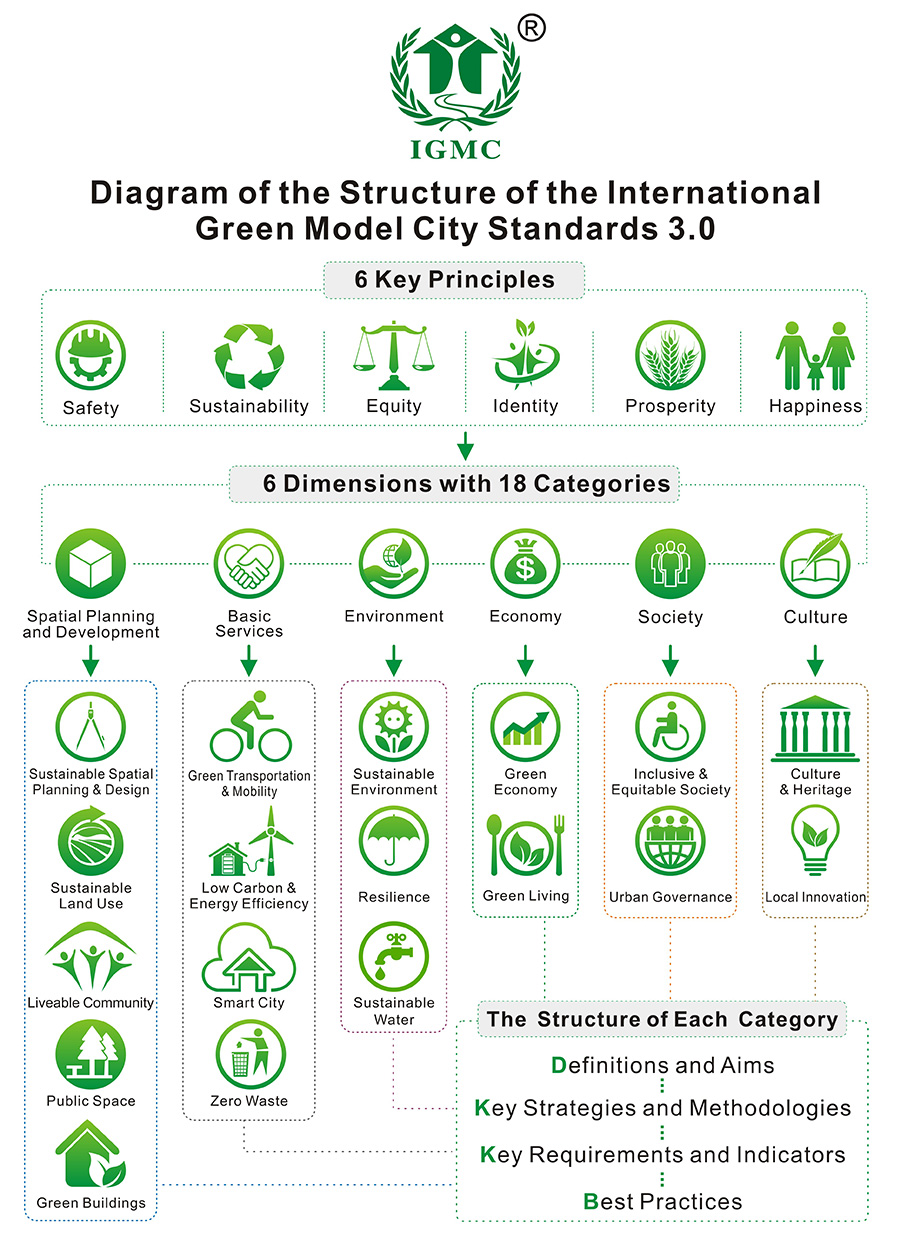


Committed to Sustainable Cities and Human Settlements for All

In Special Consultative Status with ECOSOC
Search
NameDescriptionContent
Home>>Text
International Green Model City Initiative: Call for Stronger Actions Towards Safe and Carbon-Neutral Cities ——The First Preparatory Webinar of GFHS 2021 Successfully Held
Source:
|
Author: gfhsforum
|
Published time: 2021-01-18
|
2663 Views
|
Share:


Some of the speakers and participants
2021 will be the year of green transformation, and the year of a global action towards carbon neutrality. In the five years since the Paris Agreement, an increasing number of countries, regions and cities have made solemn commitments to achieve carbon neutrality and make concerted efforts in building a sustainable future. Whether or not we can achieve green recovery and zero-carbon revolution in cities has an important bearing on the future of human destiny and decides whether battle for sustainable development will be won or lost.
As a low-carbon green city global action plan, International Green Model City (IGMC) Initiative provides technical tools and action guidelines for sustainable urban planning, and zero-waste and zero-emission green development. 41 well-known municipal governments and companies have joined the IGMC Initiative, creating an effective network for sharing knowledge and experience, and facilitating mutual cooperation.
Well-known experts shared the progress of IGMC Initiative, and the strategies, approaches and tools the IGMC Standards provide for promoting healthy, resilient, and carbon-neutral cities and, at the same time presented advanced knowledge and success cases on urban planning, design and development, bringing policy recommendations and solutions for local governments, institutional investors and concerned stakeholders.

The speakers: Lu Haifeng, Dr. Elena Manaenkova, Prof. Franz Gatzweiler,
Dr. Kelly Wang, Chang Hao, Alex Camprubi
GFHS Secretary General Mr. Lu Haifeng pointed out in his opening remarks that five trends will manifest themselves distinctly in post-pandemic urban development: decoupling, decarbonization, decentralization, digitalization and glocalization. We need to learn from nature and live in harmony with nature, and rethink, reevaluate, redesign and reshape the current cities, for the purpose of achieving harmony between urban development and the natural ecosystem, and ensuring ecological balance and security. Green is the basic color of nature, and making cities green is tantamount to following the law of nature. International Green Model City Initiative provides technical support and learning platform for the purpose of building safe, carbon-neutral and sustainable cities and human settlement for all, accelerating green transformation, and implementing the 2030 Agenda for Sustainable Development, Paris Agreement and the New Urban Agenda at local level.
WMO Deputy Secretary General Dr. Elena Manaenkova emphasized that to save lives and minimize losses the Multi-Hazard Early Warning Systems are highly recommended as single cost-effective systems to deliver warnings on a wide range of hazards. Climate change makes it impossible to rely on past experience for future planning. To build truly resilient cities, urban planners need to look beyond the next storm and use climate predictions and projections to plan and prepare for long-term changes in weather, climate, hydrology and environment. Demand-driven approach (understanding diverse urban users’ needs) and multi-sector partnerships help produce and deliver tailored services and impact-based warnings.
Prof. Franz Gatzweiler, Executive Director of International Science Council Programme on A Systems Approach to Urban Health and Wellbeing indicated that human impact on earth has accelerated exponentially, crossed planetary boundaries and is putting human, urban and planetary health at risk. Cities impose the largest pressures on planetary health. Understanding the connectedness of human and planetary health requires a systems approach, allowing us to see how complex urban systems work, identifying solutions and performing actions which stop and reverse adverse trends. It is our main focus to enhance systems intelligence.
Dr. Kelly Wang, Deputy General Manager of Overseas Division, Country Garden Group shared that Forest City integrates the concept of "green" and "smart" in the overall planning and design and industrial development for the purpose of making a smart green cultural city that is suitable for living and working, and is able to attract the best talent and green industries. By taking advantage of the unique Singapore-Malaysia geographical advantages and competitive green industry preferential policies, the project has contributed to the effective implementation of local, regional and global green industry chain.
Focusing on distributed energy technology and development, Mr. Chang Hao, Vice President of Huadian Electric Power Research Institute showed that the key pathway of the future energy transition is to create a new generation of energy system that is widely interconnected, intelligent, resilient, safe and controllable, and enables interaction between the supply side and demand side. It is critical to make full use of digital and intelligent technologies to manage multiple energy sources in a coordinated manner, enhance the renewable energy accommodation, and meet the diverse needs of users. We need to give full play to the energy resource endowment of cities and regions, carry out coupling multi-energy system, improve the absorption capacity of wind power and photovoltaic power generation, break industry barriers, and realize the collaborative supply of electricity, heating, cooling, and gas.
When giving a presentation on “Sustainable Spatial Planning of Bintan: The Green Intelligence Island of Indonesia”, Mr. Alex Camprubi, Senior Advisor for Fundacion Metropoli Spain, Senior Architect, Planner, Landscape Designer stressed that in the Knowledge society, high quality landscapes and open spaces form the basis of competitiveness. The Bintan Project in Indonesia is an example of a collection of innovative and mature sustainable planning strategies to reinforce existing exceptional assets of Bintan and thus improve its competitive advantage. For example, Second Nature is a sustainable strategic proposal for improving the environment and the landscapes of the Bintan Island while adding value to its existing natural resources.
UN Secretary-General Antonio Guterres stressed at the One Planet Summit that “2021 must be the year to reconcile humanity with nature.” “We begin a new year under the sign of hope.” He called on the international community to make greater efforts in protecting biodiversity and enhancing climate action.
Taking place in time at the beginning of the New Year, the webinar was designed to promote the recommendations from the “Climate Action Summit” and “One Planet Summit” and provide cities pathways to a green recovery and a safe, resilient and carbon-neutral future. The main pathways which are advocated by IGMC Initiative and Standards include adopting integrated sustainable spatial and territorial planning strategies; making mid- and long-term carbon neutral city action plans; accelerating the development and utilization of renewable energy and improving smart energy infrastructure; establishing integrated health, climate and urban environmental services; expanding investment in urban green infrastructure; and enhancing urban governance efficiency and innovation. At the same time, the webinar urges that in order to maintain feasibility and credibility, cities and countries must transform their net-zero commitment into strong immediate policies and urgent actions, and deepen solidarity and cooperation.

Other distinguished attendees include Arab Hoballah, Senior Sustainability Expert, former Chief, Sustainable Consumption and Production, UNEP; Serge Salat, President, Urban Morphology and Complex Systems Institute, Paris, France, Leading Expert of International Green Model City Standards 3.0; Pam O'Connor, Former Mayor, Santa Monica, Director of Metrolink, Southern California Regional Rail Authority, USA; Sipho Madi, Director, Business Management Support, Department of Housing, City of Johannesburg, South Africa; Zhang Yin, Vice President, Ecocity Research Institute, China Academy of Building Research; Hong Tiecheng, Member of the Expert Committee of China Folk Architecture Research Association; Li Fuquan, President of China Myanmar Economic Cooperation and Development Promotion Association; David Liu, Chairman, Sichuan David Architectural Design Co., Ltd; Dr. Wang Tiansong, Director of Climate Change Technology Centre (Shenzhen), and senior representatives from IGMC Partners such as City of Kuala Lumpur, Davao, Quezon, Vancouver, Vitoria-Gasteiz, Yangon, Lanxi, Changshan County, Liuyang Economic Development Zone (High-tech Zone), Tianjin Eco-city, Sino-German Ecological Park; The Yangtze River Demonstration District, and Qingdao West Coast New District Ronghe Holding Group.
The complete success of the webinar has made important contribution to the 16th Annual Session of Global Forum on Human Settlements that is scheduled for October 2021.
Copyright © Global Forum on Human Settlements (GFHS)
